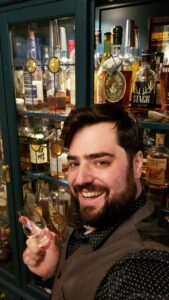Spotlight: Charles Steele
Only 215 bottles and counting.
One of Attorney Charles Steele’s passions — beyond the litigation and resolution of workers’ compensation claims, of course — is his collection of whiskeys, primarily America’s only native spirit bourbon. What started as a visit to Kentucky’s “Bourbon Trail” has become a love of whiskeys from all over the country, including many from local micro-distillers.
Bourbon, a type of whiskey, by law must be distilled in the United States with a mash bill of least 51 percent corn, and any percentage of malted barley, rye and sometimes wheat, and aged in charred new oak barrels. Contrary to popular belief, it is not required to be made in Kentucky to be called Bourbon. Bourbon almost disappeared 30 years ago because clear liquor was the drink of choice, but a resurgence of bourbon in the U.S. right now speaks to its new popularity everywhere.
No one actually knows how, or when, or why, Bourbon was invented; there are no records about the first Bourbon as we commonly enjoy it. Each distillery has a legend, but they will all tell you that outside of the story no one really knows.
Conversation pairs best with whiskey: “I love tasting with my friends and family,” Charles says. He loves sharing bourbon, as well as other whiskeys, and describing the depth of flavors, the complexities and varieties that make this his passion. Otherwise it’s just bottles of old corn water.
Whiskey has its own vocabulary. Charles might tell you about “aroma,” “palate,” “finish,” “color,” “clarity” or “viscosity.” The distilling industry uses words such as “retronasal olfaction” and “acetates” to describe the tasting and consumption, while “lignin” and “vanillin” describe how the liquid interacts with barrel wood. In Charles’ practice, he is confronted with abbreviations, such as “KOW,” “LEP,” “PPD,” “RTW” and “BIIA,” which are nearly meaningless outside of this industry.
While he considers himself a real enthusiast, Charles is not one to tell new enthusiasts they’re not REAL if they drink bourbon with coke, or ice, or water, or don’t have this bottle, or don’t drink high proof offerings, etc. Communication and case updates pair with Charles’ legal practice. He will listen to your particular claim issues, offer non-judgmental ideas, and tell you about his latest bourbon “find,” if you ask him.
Every bottle is unique, as is every claim. Some go smoothly, some are rough around the edges.
There’s always a new bottling, a new distillery, a new claim file. When Charles is considering a new whiskey, he starts with research, spending time determining if it is duplicative of something he already has, or if it would be a totally new experience. The collegial environment at the firm is a trove of research, which Charles uses to explore whether the details of other successful claim resolutions might provide a solution for the one he’s working on.
“Sometimes you can put in a lot of time, but it’s a real stinker, doomed from the start and you had no real way of knowing until you take a sip or look at the file,” says Charles. “You can’t make any assumption about a case – or bourbon – simply by first appearances, you need to study, and build an assessment of what you’re working with. You do the work. Sometimes the result is favorable and your hard work is rewarded, but sometimes despite your hard work and diligence you’re skunked. No matter what, you have to take what you learn and apply it to the next time.”
And maybe buy a Coke to help dilute the disappointment.
Read Charles’ personal reviews in The Whiskey Wash, one of the largest online publications for whiskey enthusiasts.
